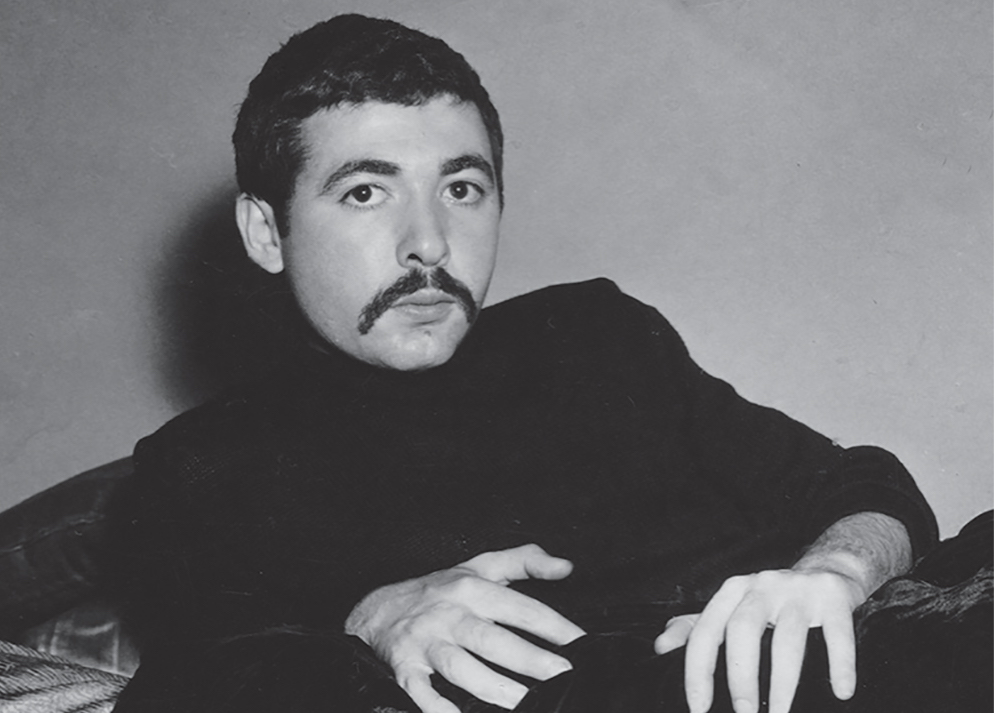Written in 1958 but given due packaging in a new book from Song Cave, Lionel Ziprin’s Songs for Schizoid Siblings are, at the simplest assessment, a historical oddity. They were even at the time of their composition. But their rhythms and psychological shape should be deeply familiar to most of us. Here is one example:
 i had a friend.
i had a friend.
i had a friend.
his name was pembrooke pete.
i had a friend.
i had a friend.
till he moved down the street.
Limericks! And songs, nursery rhymes, funny little catalogs, most of which roll out in the meters and rhyme schemes of our childhood. We might think the conceit is ironic, that these are excruciatingly hip — and hip they certainly are — but indulging oneself in these for more than a few minutes and one begins to perceive two distinct qualities to the poems of this three hundred page volume that bring them beyond mere curiosity. First, for as whimsical and wry as these pieces can be, they are also extraordinarily genuine. Second, they evince — both across and within the poems — a sophisticated layering of mystical pursuit, existential inquiry, and historical anxiety. These are, in short, real poems — more real than many.
Editor Philip Smith’s highly incisive, nimbly written introduction provides ample context. Here’s his deft description of Ziprin:
a brilliant parodist of conventional thought forms and modes of expression, a mystic steeped in actualized esoteric insights rooted in an exotic and particular familial lineage, and a wildly creative artist at the center of the center of the underground scene on New York City’s Lower East Side at its inception. (p vii)
Ziprin wrote the poems for his son’s fifth birthday, allegedly in only “a couple of days.” Smith quickly cites Mother Goose, Dr. Seuss, Robert Louis Stevenson, William Blake, and Edward Lear as clear influences, and also notes Ziprin’s reading interests, as indicated himself in a college application, as including Thomas Wolfe, Francis Bacon, Robinson Jeffers, Carl Sandburg, Edna St. Vincent Millay, Robert Frost, Arthur Waley’s translations of Chinese poetry, Archibald MacLeish, Muriel Rukeyser, Greek and Roman classics, Percy Byce Shelley, and William Saroyan. Ziprin famously employed the groundbreaking artists and filmmakers Harry Smith, Bruce Conner, and Jordan Belson; and a quick spin through the blurbs — by John Zorn, Jonas Mekas, Carol Bove, and John Yau — and we see, as well, that Ziprin has a very cool fan base (for a fuller account of Ziprin and in his place in New York’s artistic milieu, you might check out Yau’s exhibition review at Hyperallergic).
gazelle and chipmunk very sad
agreed the grass was rather bad.
“we’ll dip it in a light blue lake
and lay it on a birthday cake,
and when the parts are nicely sliced,
its layers cooled, its surface iced,
we’ll take it to a chap we know
whose trade is making candles grow.
that done, we’ll have a cake so rare
that should we toss it in the air,
the thing will float and rise so high
’twill pass the brightest planets by.”
There is in an undeniable sweetness to these — a father’s love, a gift of simple verse — but the context of the birthday also secures these poems within the domestic sphere, and that is surely what helps cement, as well, their genuineness. As Smith notes:
A real distinction of Lionel Ziprin’s work as a whole — and Songs for Schizoid Siblings in particular — is its lack of a calculated cultural or aesthetic pretense, its oracular embrace of the crafted and immediate. It neither clamors for attention nor makes a fetish of obscurity, and it is unblemished by any positioning instinct.
Smith is rightly careful, elsewhere in his introduction, not to fully extract Ziprin from his cultural surroundings, but nonetheless this word keeps popping up: immediate. The domestic occasion and visible craftwork of these poems make them stand upright in a continuous present. They feel, mostly, out of time, or of all time, and they invite readers to pick them up, play with them, feel their contours. The material feel of the poems are surely the result, as well, of the fact that Ziprin owned and operated, literally, a greeting card company (this is the company for which Smith, Conner, and Belson worked), and it was through the practice of drafting highly formal greeting card copy, as Smith notes, that Ziprin developed his “lapidary concision.”
apples start by being green
and end by being red.
though i rise early sunset
by sunrise i’m in bed.
The novelty is here, for sure, but through these forms — almost necessarily through them — Ziprin is doing something far more interesting, as I hope you can begin to see in these examples. These whimsical subjects — apples, animals, birthday cake — become occasions for a complete metaphysical overhaul, an ecstatic query of our cosmological order. See how deftly he reverses not just quotidian but seasonal time in the above example, how smoothly he invokes something of a reverse image of ripening, and thereby of all time, of the apples trees shrinking back down into their seeds, without ever actually describing that image but positing a reversal: “by sunrise I’m in bed” — Ziprin, perhaps, as the nocturnal prankster? If that example is too convoluted, here is a more direct one:
the loaf’s located in the crumb.
return to where you started from.
reverse directions and you find
the inner edge of outer mind.
And another one:
to photograph
the golden calf
you laugh
and slice the lens in half.
In poem after poem we see Ziprin flipping around the ways we see and the logics by which we think. In some cases it is through a kind of geometric or spatial play (“square is the earth and round the sky, / and i have the ruler to prove it by”), and in others it is a positing of or arriving at a viewpoint of surprising and obstinate images, as in this abecedarian poem, which would verge on nonsense if it weren’t for the pregnancy of Ziprin’s word/image choices:
a is the aether that anchors the ark.
b is the blemish that brightens the bark.
c is the crimson that circuits the chance.
d is the demon that deadlocks the dance.
e is the ergot that extrudes the ear.
f is the fungus that fractures the fear.
We have a palpable sense, in the above example, that the strict structural guidelines of the poem bring it to revelatory difficulty, an occult image pulled in card or burned in bone that will neither allow us to easily interpret its message nor dismiss its vehicle as meaningless.
Which is to say, there is a certain degree of anxiety and even dread that animates many of these. In some cases, as above, it’s precisely the sort of darkness we might be accustomed to in nursery rhymes (demons and monsters and dark, fetid places). But in many others the dread is more subsumed, insidious — more existential. The opening example about pembrooke Pete moving down the street displays this. We might chuckle that the trouble in that poem is far less drastic than we anticipated, and yet it nevertheless is the evaporation of a friend from the world, a person who is suddenly gone. Perhaps it describes the painful fact that our worlds and problems are quite small from an outside vantage yet monumental from our own.
Elsewhere Ziprin responds to notable historical anxieties, with brief but clear references to things like the atomic bomb — which are just enough to paint a contextualizing, psychic backdrop — or in poems such as this brief couplet about advanced physics:
the lightwave in the vacuum flails
between the wavelength and the scales.
It’s a funny little poem about the unusual status of photons — both a particle and a wave — but that word choice, “flails,” bound so tightly to its rhyme, imbues this with a far greater sense of anxiety over the indeterminacy of the world, that the world at its most basic level is unstable. These nods to the modern world also contextualize the religious and mystical pursuits of the poems (Ziprin came from a heritage of and was extremely knowledgeable about mystical rabbinical studies such as the Kabbalah). Religion and mysticism is a response to a secular, scientific world that, throughout the twentieth century, was proving to have at once fewer and fewer answers and greater and greater dangers.
At times Ziprin is quite direct about anxiety, both historical and as a fundamental condition, and these can be fascinating moments. In these sorts of poems, adult anxiety and existential dread are not esoterically delivered through an otherwise seemingly benign nursery rhyme (so as not to scare the children, let’s say) but explicitly approached. Here is one example:
i see
catastrophe.
i hear
the buzzards near.
i smell
undiluted hell.
i taste
what can’t be faced.
This is, I’ll argue, one of the most suspenseful poems I’ve ever read, even though it seems lost in the generic: catastrophe, buzzards, hell. The amateurishness this suggests places the poem in the mouth of a regular person, someone wrestling with nuanced feelings with a fairly basic set of linguistic or symbolic tools. It sounds like a child who is aspiring to adult concerns, learning how to have angst. But that only gives it a powerful mimetic position as a kind of universal or fundamental human response.
And then there is, in fact, a very subtle but highly effective art to this. The use of basic sensory perceptions reinforces the fact that we are beholden to those faculties — we are always in some ways removed from reality by the sensory world. The effect is something like dread — not the terror of the immediate but the dread of the anticipated. Yet the poem’s soundwork surprises this, effecting something like a volta in the end couplet. These horizontal “ee” sounds (“see,” “near,” “hell,” so on) lay out a ground up from which rushes that final long “a” sound of “taste” and “faced” like a vertical object sprung from the earth. The effect starkly contrasts what Ziprin has set up — it “can’t be faced” and yet, sonically, we seem to be facing it, all of a sudden. So dread becomes something more like imminence — it’s what you fear, and then it happens.
This is heavy stuff for a five-year-old birthday party. Of course I’ve been choosing examples to prove the maturity of these poems, but these examples we’ve seen, these sophisticated anxieties and mystical pursuits, philosophical conundrums and metaphysical inversions, comingle with the ecstatic, with reassurances, entertainments, and general delights. Indeed cakes are made, jokes are told, and there are grand moments of merriment. It’s definitely accurate to call these poems parental or fatherly, and the takeaway is something of a classic message to one’s child: you will face many uncertainties as you move through this world; do not worry, I’ve faced them too. And indeed there are moments when this sort of tender affection is itself quite direct. Let’s close with one of those:
dear love, may i give you sweetmeats to cure,
all that’s uncertain and all that’s unsure?




